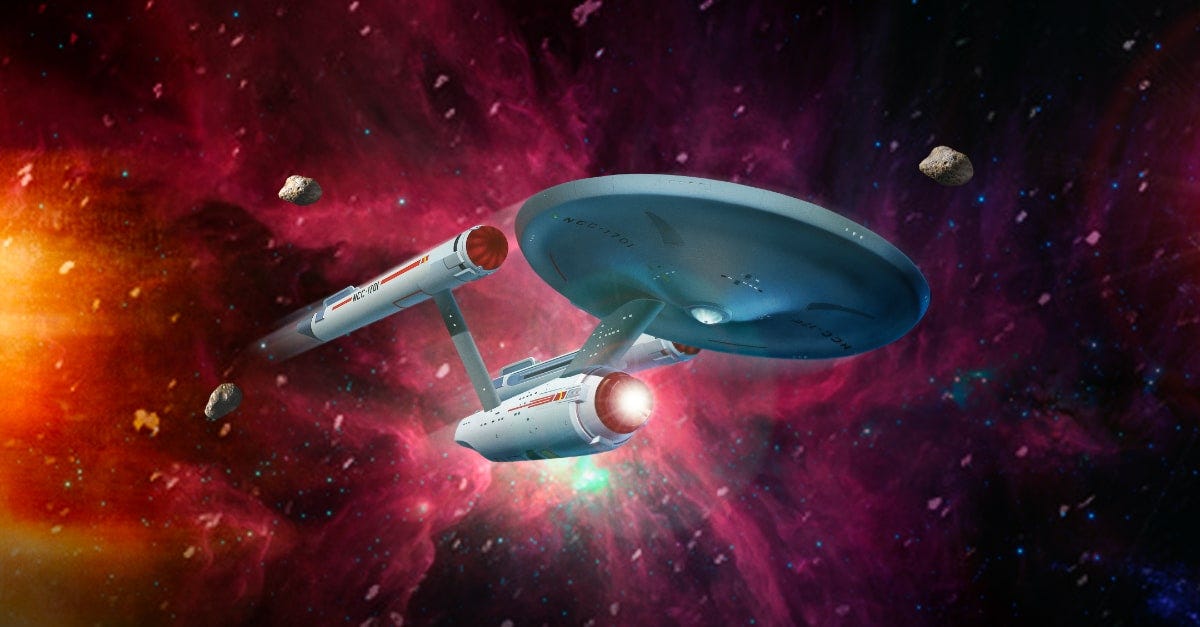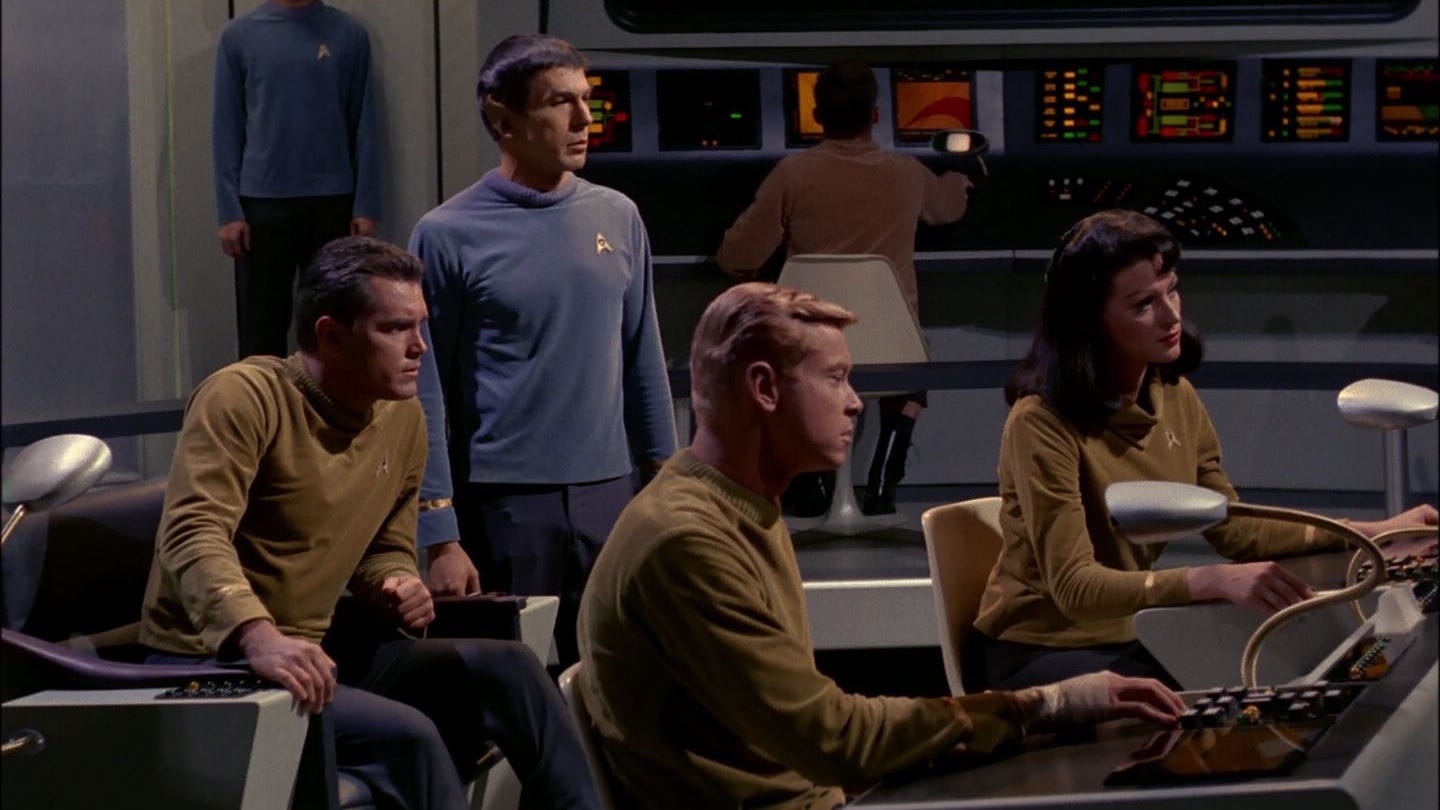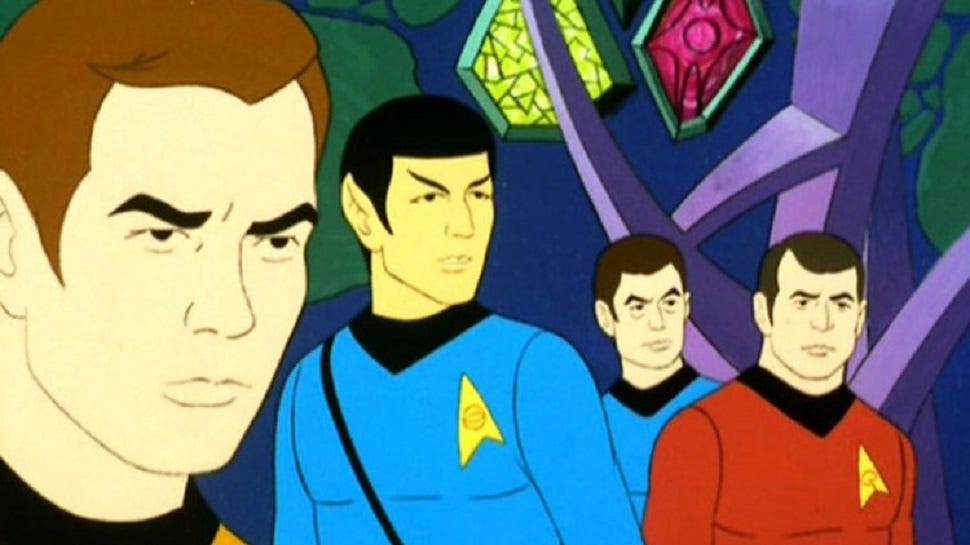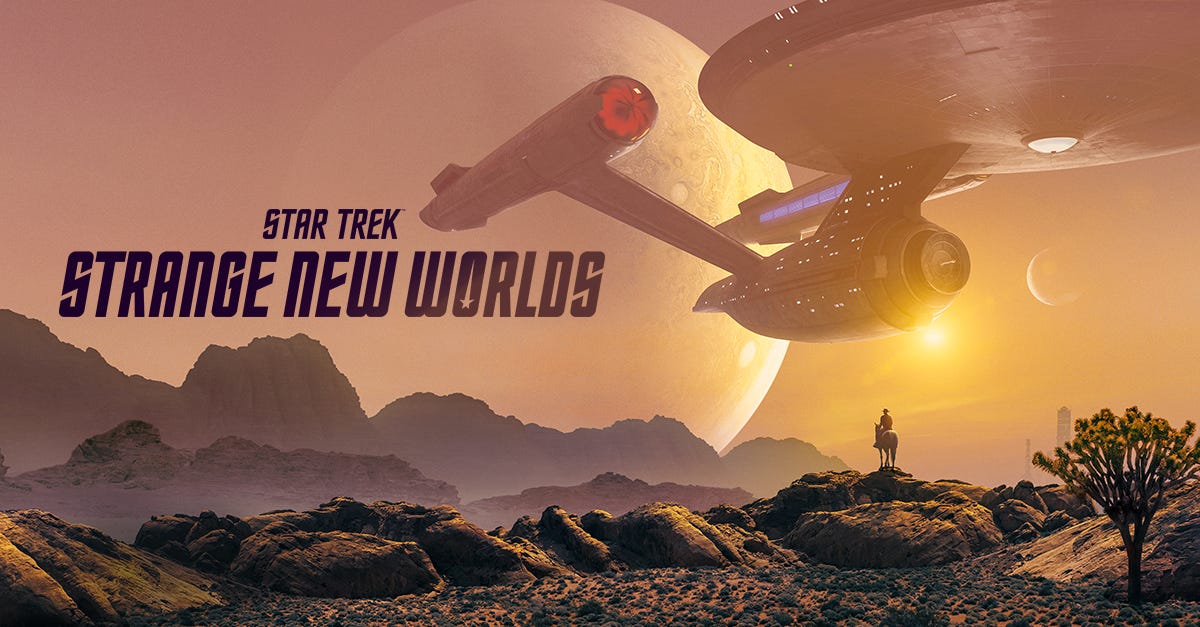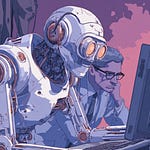➡ Reminder: I will be writing much less frequently and much shorter in November — and November only. So for this month, I have paused payment from paid subscribers.
Also, I’m making all new content free without a paywall. In December, however, everything will be back to normal: typically three meaty essays and two enlightening Q&As a week, along with a pro-progress podcast like this one 👇 several times a month (including transcript). And, of course, a weekly recap over the weekends.
Melior Mundus
Here at Faster, Please!, I write a lot about the need for optimistic, inspiring science fiction. As I’ve put it before:
It’s important that our culture create aspirational and inspirational visions of the future. Underlying the rapid advance of human progress over the past quarter-millennium has been a powerful optimism about tomorrow combined with what sociologist Elise Boulding has described as a “utopian sense of human empowerment.” We have to believe that the inevitable disruption caused by progress will be worth it — if we make the right decisions.
We also need to believe that we can invent, broadly, the future we want. Right now, however, it seems we think that we’ve carelessly created a future that our kids and grandkids won’t want — a future of rising temperatures and rising inequality. And since the early 1970s, Hollywood has both reflected and encouraged that gloomy belief. But sci-fi could again be pro-progress and future-optimistic (what I call “Up Wing”). It could have plenty of dramatic tension while also showing a path toward a better, although still imperfect, world.
I'll often ask my podcast or 5 Quick Questions guests/interviewees to point to an example of that kind of science fiction. And perhaps no film, book, or TV show gets held up as the standard for sci-fi more than Star Trek. To learn more about the history of the franchise and to discuss its future-optimism and cultural importance, I'm speaking with Ryan Britt.
Ryan is the author of the tremendous new book Phasers on Stun! How the Making and Remaking of Star Trek Changed the World, out earlier this year. Previously, he wrote Luke Skywalker Can’t Read and Other Geeky Truths. Ryan is also an editor at Fatherly and a contributing writer for Inverse; both BDG brands. In addition, he also writes regularly for Esquire, Den of Geek! and Star Trek.com.
In This Episode
The Original Series and ‘60s sci-fi (1:19)
The mainstream appeal of Star Trek (5:44)
Star Trek’s future-optimism (12:06)
The essence of Trek (21:24)
Below is an edited transcript of our conversation.
The Original Series and ‘60s sci-fi
James Pethokoukis: When originally broadcast, Star Trek did not have great ratings. Obviously it has become an institution since then. Why didn't it do better when it was first on regular television back in the ‘60s?
Ryan Britt: It's a little bit of a matter of debate. One of the people that I interviewed for my book, Marc Cushman, did these deep dives into the ratings for his books, which were these very, very in-depth books called These Are The Voyages. And his contention is that if you look at it by today's standards, five or 10 million people is a lot. Now we have all these streaming services that target these niche audiences and stuff like that. It would no longer be considered a failure. But at the time, you only had three networks. You had NBC, CBS, and ABC. And Star Trek was on NBC, and it didn't compete in the way that NBC wanted it to long term.
That said, it had a very strong start. And Lucille Ball who ran Desilu Studios that produced Star Trek sent a note of congratulations to Gene Rodenberry when it started, saying they were off to a great start. But the flip side of that is we forget that Star Trek introduced mainstream American television audiences to all this stuff in science fiction that they had no exposure to before. On the one hand, five, 10 million people, 20 million people, might not seem like a lot compared to today's viewership, but back then it was a huge explosion.
When talking about the original series, people often will say it was really a piece of its time with a “New Frontier” spirit. You had the Cold War analogies between the Federation and the Klingons; you could even look at Captain Kirk as a John F. Kennedy kind of character. But those are really things of the early ‘60s. And granted, it's the same decade, late ‘60s. But there was a big difference between the America of 1960–62, then getting into the heart of the Vietnam era, civil rights, the late 1960s by the time the show aired. I wonder if you think that had a role, that already by that time it seemed maybe out of step with the America of that era?
It's funny because science fiction in general—this is true of all science fiction, whether it's print or film—it always is oddly a little behind. Star Trek was taking this imagery that you would see on the covers of pulp science-fiction magazines from two decades prior. The way in which it kind of looks reminds you of old issues of Astounding or Amazing Stories and things like that. But its sensibilities were coming from these ‘60s writers who were part of what was called the New Wave. People like Harlan Ellison and Norman Spinrad. And they were people that were pushing back against those more conservative science-fiction print traditions. So you've got this collision.
In the book, I talk about how the oldest person that wrote for the original Star Trek was born in like the 1900s because of the time it was made. But then the youngest person was like born in the ‘40s, David Gerrold who was writing for the original series. So I think you have a lot of collision of generational viewpoints in the original series. You have really young writers and really old writers. And Roddenberry is somewhere in between. He's in his 40s when this is all happening, and he had a big television career before that. I think that Star Trek is a lot of different generational styles and sensibilities happening at once. I think that's also true of the later shows. Like the cliche goes, it's not a bug, it's a feature. Maybe that's why it's good: because there are these different competing ideologies. But I do think that it may mean that the original series has a little bit of a muddled message sometimes for a contemporary viewer.
The mainstream appeal of Star Trek
I started doing kind of a rewatch not so long ago. So, of course, I started with the original pilot, which did not have William Shatner. And that original pilot was criticized by the network as too cerebral. It was a little chilly. It kind of reminded me more of late-‘60s science fiction, something like 2001, which was also kind of chilly, very cerebral. The Star Trek we know was different. They added William Shatner, they had a captain who would hit something. (I think that was one of the notes from the studio: We want there to be fistfights.) If we had stuck with that original feeling from the very first pilot episode, I wonder if that would've made a difference, if the show would have been more popular, less popular…
I think there are a lot of things going on in there, and you're right about everything you just said. Roddenberry also wanted fistfights. That's the thing that people forget. Roddenberry sort of cast himself as this person who was a pacifist and didn't want a lot of conflict by the time The Next Generation happened in ‘87. But in the original series, Rodenberry came from writing westerns. He wrote Have Gun—Will Travel. He came from writing those fisticuffs. He wanted his morality tales in an action-adventure show. The way Roddenberry talked about Star Trek to the fans is not the way Roddenberry talked about Star Trek to the writers and the producers. He sold it as an action-adventure show. There is nothing in the series bible that says anything about it being a progressive, politically peace-making show. There is nothing. And many of the writers who I spoke to who are still alive, like Judy Burns who wrote “The Tholian Web.” She was like, “There's nothing in the writer's bible that is the Star Trek that we know today. It was an action-adventure show. It was a western in space.”
To your direct question, had “The Cage” with Jeffrey Hunter and the mind experiments with the Telosians and all that kind of philosophy: No, that show would not have worked. It's great that we have Anson Mount and Rebecca Romijin doing this kind of rebooted version now on Strange New Worlds of Captain Pike and those characters. That episode is great as a thought experiment. But it's not very diverse, for one thing. There's no Sulu, there's no Uhura, there's no Scotty. Those characters aren't that fun. Jeffrey Hunter's Captain Pike is depressed. He's talking about quitting in the first episode. And to your point, it does feel a little bit closer to the kind of late-‘60s sci-fi movies. But it's also closer in tone to what was in print science fiction, like a sort of cranky white guy hero who sort of has to fix something. Whereas when they got Kirk… They needed Kirk, they needed Shatner. The show needed that. The show needed the diversity. It needed Uhura and Sulu, it needed Scotty, it needed Bones. Boyce, who's the doctor in “The Cage,” is funny. But he's not Bones. When you watch “The Corbomite Maneuver,” which was the first episode they filmed of the original series with the regular cast after “Where No Man Has Gone Before,” the first scene Bones is saying, “What am I, a doctor or a moon shuttle conductor?” and he's hilarious. And Kirk's got his shirt off and he's working out, and Spock's saying something is “fascinating.” It's great. You don't have that in “The Cage.” So no, I don't think it would've connected with people, because the characters weren't as, for lack of a better word, romantic and fun as they became.
Let me read something my friend, the journalist Virginia Postrel, recently wrote about Star Trek: “Star Trek’s fundamental appeal was not about the future or technology per se. The show portrays a setting in which smart people have new experiences and learn new things, solve important problems, and forge deep friendships. Nobody worries about money or office politics. The show’s values are humane. Everyone’s job is important and the boss deserves respect. … [F]or many of its fans, Star Trek represents an ideal workplace. Star Trek’s vision of a nerd-friendly universe made the future glamorous, but only to the select few for whom that vision resonated.”
I believe her point was, and also to your point, that that kind of nerd-friendly universe may not have resonated enough when there were only three channels. But it certainly would resonate if we had today's streaming services. Her general point [is] that it's not about the future or technology; it's about something else, that gets to its enduring popularity.
Something that also gets left out a little bit, which is a little bit more fundamental and perhaps sounds kind of boring when you say it, but there had never been a science-fiction program for adults with recurring characters. Ever. Doctor Who debuted in 1963, but it was a family show. Lost in Space debuted in 1965, but it was a family show. The Outer Limits, Twilight Zone: These were anthology shows, and they were also off the air by the time it was 1964. Just the idea that if you were interested in, as you say, this kind of setting—or as Virginia says, a science-fiction setting that allows for all this—there were just no characters to latch onto for a TV audience. I think that that is part of it: It’s just that it was novel. This is something people forget, because now there are a million science-fiction shows and they’re a dime a dozen. But that was novel at the time.
Norman Spinrad, who wrote “The Doomsday Machine,” who I interviewed for the book, was like, “This was like for science fiction when Dylan went electric.” It brought these things out to a bunch of people. And science fiction before that is kind of like folk music. I think it was geek friendly or nerd friendly or whatever, but I think what people forget is that relative to the rest of science fiction, Star Trek is ridiculously mainstream. It only was in the ‘70s where Star Trek suddenly became niche relative to Star Wars. And that's only because George Lucas actually said, and he's quoted in the book saying this, Star Trek made that possible. It proved that you could do big, mainstream, science fiction for adults and for everybody if you had the right sort of zip to it—and he wasn't talking about philosophy or science. I think that's the impact, too. It’s just the idea that science fiction became mainstream, is because of Star Trek.
Star Trek’s future-optimism
I would like to think that the enduring popularity and the various other incarnations and spinoffs have something in common, which is, I guess superficially you could say, optimism. But more really, the idea that the future is not going to be perfect. This is not a show about a utopia, though maybe it seems like utopia compared to where we are right now. It's a world where there are still problems, but we can solve those problems. And maybe how we solve those problems could create more problems, then we'll solve those. But again, I like to think that the popularity is really about not just that, yes, tomorrow will be better, but it'll be better because we can fix it and just keep solving one problem after another until things get better.
I've been watching a lot of Star Trek: The Animated Series with my five-and-a-half-year-old, this 1973 animated series, which is really interesting because I did watch a bunch of it while I was writing the book in 2020 and 2021. But now she's even older and we have a Star Trek night and we watch the animated series together. And my daughter is already hip to how this works: When the conflicts are introduced in an episode of Star Trek: The Animated Series or a few of the episodes of the original series that we've watched, she always knows. She'll turn to me and be like, “But they're going to become friends with it in the end.” There's a giant cloud that's going to envelop this planet in this animated series episode called “One of Our Planets Is Missing”—sounds exactly like the plot of the motion picture because it is. My wife was overhearing the dialogue. She's like, “Oh my God, this sounds terrible. All these people on this planet are going to die.” And my daughter calls to my wife from the kitchen. She goes, “Spock's going to talk to it and make it nice.” And I think that's the thing: There's always an understanding. Even a five-year-old can pick up on the pattern of Star Trek: This looks like a monster; it's not a monster. This looks like a bad person; they can come to an understanding with it.
And there's not a lot of action-adventure shows from the ‘60s or now, really, that are like that in general. I was making a joke that in 2020 you had a debut of The Mandalorian (which I love) season two and Star Trek: Discovery (season three) within a week of each other, two weeks of each other, something like that. Both episodes had characters fighting against what was kind of a giant space worm creature. And in The Mandalorian they just blow it up. They just kill it. They put bombs in it, they blow it up from the inside. And in the Discovery episode, the character Cleveland Booker, played by David Ajala, literally empathizes with it and calms it down. And that's the difference. That's the difference between Star Trek and almost everything else except for maybe Doctor Who.
I think it's important that we have optimistic, problem-solving science fiction. I’ll ask some guests, “Can you give me an example of something that you watch that you think meets those criteria?” And then I finally had to say, “other than Star Trek,” because I kept getting Star Trek as the same answer.
Doctor Who.
Doctor Who would also be an excellent answer. Why isn’t there more? You mentioned Doctor Who and Star Trek, two long-running, successful franchises. Why are there so few examples of that, while there's a lot more apocalyptic, zombies, “we're doomed in the end,” that aren't problem solving and, you could say, optimistic?
I don't know. It's a good question. That's an interesting question. I think that sometimes I actually am surprised that even we have Star Trek and Doctor Who! Sometimes I go in the opposite direction where I'm like, we're so lucky to even have these things. I just did a big essay on early Sherlock Holmes stories a couple weeks back for Esquire. And something that I always like pointing out to people that might not read Sherlock Holmes is that most of them aren't murders. Most of the good stories are not murder mysteries, they're kind of something else. And Sherlock Holmes is another kind of interesting example of a sort of really ethical but flawed person who's always trying to see like, “Oh, maybe this person's not the villain. Maybe it's the other way around.” And of course Sherlock Holmes has influences on Star Trek because of Nicholas Meyer who directed The Wrath of Khan and because of Michael Chabon, who is creator of Star Trek: Picard—and many other Sherlock Holmes connections to Star Trek, Spock in particular.
But why are there not more? I suppose it's just because it's easier to write conflict… You have to have conflict in fiction, and it is easier to have just James Bond or something, which is something I know a lot about. I know a lot about Bond. Even those books though, he doesn't have a gun as often as you might think, not as much as he does in the movies. When it comes to adventure fiction, violence is embedded into that, whether it's a western or whether it's a detective story or something like that. When you don't do that—like with Star Trek, they make a choice: The phasers have a stun setting. With Doctor Who, they made a choice: He doesn't have a gun. And when the Doctor does have a gun, it's a big deal. And the same thing with Star Trek. Kirk in “A Taste of Armageddon”: “I will not kill today.” They have to make it part of the storytelling to almost subvert the rest of adventure fiction in a way.
I'm a fan of The Expanse, and there's a great scene—I forget if it's also in the book, I know it's for sure in the TV series—where it looks like there's going to be a war and fighting is going to break out. And the main character, Holden, says, “Let's try something else.” To me, Star Trek is everybody constantly thinking, “Can we try something else other than blowing something up?”
The Expanse is great. Of course, the showrunner of The Expanse is Naren Shankar, who worked on The Next Generation and Deep Space Nine and was Ronald Moore's friend. And then you've got Ron Moore doing For All Mankind, the Apple TV series. And For All Mankind is another example where in the season two finale—that's a couple years ago now, season two of For All Mankind, I'll spoil it—where Ed has the choice of whether or not he's going to blow up these Russian ships that are going to the Moon. And Sally Ride has got a gun on him, and he decides not to. And then Danielle can abort the handshake in space with the Russians, and she quotes Captain Kirk and then she does the handshake. And that's Ron Moore's Star Trek optimism coming through this alternate-history sci-fi show. I think For All Mankind is a good example of those Star Trek-ish ideals working out in what's basically a prestige drama, which is basically Mad Men with NASA. And that's hard to do, to make that upbeat. That's a dark show, but it has a lot of optimism in it.
The essence of Trek
One of my little ideas here is that it's important that at least some slice or sliver of our science fiction be optimistic and problem solving. You can point to Silicon Valley people who say they were inspired by Star Trek. But do you think, more broadly, that it's important to have that kind of science fiction, showing a future worth making and a future worth living in? Or is it just science fiction?
I think that it's also like important that the stories are contemplative in a very specific way. I love Star Wars, but there's not a lot of different kinds of Star Wars stories. It's generally a hero's journey, good versus evil, which is fine and not negative. They're kind of unpacking that a bit with the Andor show and trying to be like, if you were a member of the rebellion, would you kind of be a terrorist? And that's an interesting sort of moral experiment, which is subversive. But it's only subversive for Star Wars, right? Because Star Wars has always been very black and white for the most part. And the morality plays don't have a lot of variety. I'm working on a book about Dune right now, and Dune is very moral and ethical in its considerations. It's just kind of like things didn't go well. The purpose of that storytelling is like, here's when it doesn't go well and here are the various intricacies of why, and then how that's connected to politics and ecology. It's not dark for the sake of being dark. I would say that something like Westworld, to me, is kind of dark for the sake of being dark. (I don't hate Westworld or anything like that. I always end up on podcasts being like Westworld!) But I do think that there tends to be a little bit of a one-note-ism is there, and even aspects of the Battlestar [Galactica] reboot would sometimes go that direction of like, wow, aren't people messed up? And then you'd kind of be like, “Yeah, but where's the hope in there?” I think something that kind of strikes that balance of it is the new Foundation show. I think that's another Apple show. I think that strikes a little bit of an interesting balance. I just think that the ideas have to be unpacked in a way, because I think you can go too sugar coated. Star Trek at maybe its worst moments, or maybe its less potent moments, would be a little too on the nose. That's about what I would say.
Of the more recent Star Trek, for some reason the new one Strange New Worlds—which is a riff on the original “The Cage,” as you mentioned earlier—people seem to have connected with that. I keep seeing versions of, “Well, that's finally real Trek. Do you know what people mean by that? Is that your impression? I don't if they mean that it's optimistic or what it is, exactly.
Part of it. It definitely is a little bit more upbeat, but Strange in the Worlds is also still significantly darker than The Next Generation. Everything is kind of relative. I think that I'm a pretty big supporter of all the new shows—Discovery, Picard, I'm talking to the Lower Decks showrunner Mike McMahan in about an hour today. I love him. That show is actually very upbeat and funny and talks about the workplace aspect of it that you were talking about. But I think that what people are responding to—and Strange New Worlds objectively has better reviews; it had like 100 percent or 98 percent on Rotten Tomatoes for a while; you can't argue with the reviews, they exist; and the reviews were more mixed for some of the other shows—I think it's about the format, frankly. I think that the serialization of Discovery and Picard was emulating the prestige style of other shows: The Expanse, Breaking Bad, Battlestar, Sopranos, whatever. And I don't know if that's the best way to do Star Trek. Deep Space Nine had a lot of serialization, and that was very risky at the time, particularly in the ‘90s. But it's not like you want to randomly watch one episode of that arc in Deep Space Nine of the Dominion War. You suddenly have to watch like two seasons. If you're going to watch one episode of Deep Space Nine, it will be a standalone episode. If you're going to watch one episode of The Next Generation, it will be a standalone episode or a two-parter. The original series, the same. Enterprise, even Voyager. Serialization, I think, tends to not age as well.
But even Battlestar, which is brilliant, I couldn’t watch just one episode of the 2004 Battlestar. I have to watch all of it. Strange New Worlds are standalone episodes for the most part. And I think that is what's connecting with people. I just watched “Spock Amok,” which is the fifth episode, again for like the fourth time the other day. And it's great. It's this great body-switch episode with Spock and T’Pring. Ethan Peck is hilarious in it. It’s great.
It's excellent.
To me, that is the main thing about it. If you want to knock Discovery and Picard for being dark, if you actually watch those and you actually see what those shows are about, it's not really true. Those shows are about optimism, about hope. The conflicts are just a little rowdier. But those shows are not about that. Those shows are about those redemptions, they just take longer. Whereas in Strange New Worlds, it's kind of a given. Some of that optimism was kind of a given in a way that was also true of The Next Generation. So I think that's the difference.
I did also ask Ronald D. Moore this question. It's the Peter Thiel question: Star Trek is the communist show; Star Wars is the capitalist show. I want to get your opinion on that. What do you think of that characterization? Is that actually an insight?
I don't know. I think it's a little reductive. I think it's a bit reductive. You could also flip it. You could just flip it around and you could easily just make the other argument. I'm not saying I agree with either viewpoint, but you could easily be like, “No, Star Wars is the communist show because the rebels want to dismantle capitalism, and the empire is capitalistic. So that's the communist show. And Star Trek is capitalistic because the Federation has a monopoly, and they just don't have money within their own government, but they screw over these other planets economically” (which we know is true). Star Trek has criticized itself, like in Discovery season three the Orions are like, “You guys still have capitalism. You just don't have it in your own space.” And then in Strange New Worlds season one, Pike goes to this planet where they're like, “Hey, you guys still trade with us.” It sounds like a dorm room argument to me. It doesn't seem that deep to me. I know there are a lot of folks who are like progressive socialists that are like, “Star Trek has got all these great examples of like how communism could work in the future.” And it's not really my deal. I'm like a pop culture critic who thinks about how Star Trek affects art and culture now. People have written books about the economy and Star Trek and stuff like that. It's not really my bag is what I'll say.
Sometimes I like to guess if the title of the book was the one the author really wanted, or if the book publisher suggested it. I'm wondering if the title of your book, in your heart, should've been Live Long and Prosper! rather than Phasers on Stun! Or was this your preference?
I had a lot of different titles. The subtitle was mine always: “How The Making and Remaking of Star Trek Changed the World.” That was the subtitle. That was completely mine, and my agent was like, “That's a winner. That's the subtitle.” We always knew, because I really liked the idea of saying that it wasn't just the making of Star Trek, but the remaking, that the book was about metamorphosis. We wanted, then, a catchphrase. I had pushed for “Spock Lives,” or “Spock Rocks” for a long time. And then we ended up having Spock on the cover, so I got that. But I was on the fence about Phasers on Stun! But then I interviewed Walter Koenig, who played Chekov of course, for a long time, not long after the January 6th thing. And Walter was so nice and thoughtful about everything, and conflicts in society and how to think and unpack all of them from all sides of the political spectrum and wasn't reductive and just a smart guy. And I mentioned to him the working title at that time. He goes, “I love that, because it means we don't have to kill each other.” And so after that, I was like, “Well, if it's good enough for Chekov, it's good enough for me.”



